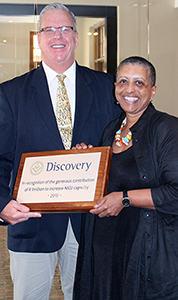Latest News Archive
Please select Category, Year, and then Month to display items

The University of the Free State’s Bloemfontein campus played host to the English Academy of Southern Africa’s (EASA) annual international conference on 7-8 December 2023. Attracting 35 delegates from Canada, the UK, Nigeria, Botswana, and South Africa, the two-day conference delved into the theme, “Ways of Reading: Literature and Literacy,” with a diverse group seeking to unravel the intricate relationship between literature and literacy.
The proceedings were inaugurated by Prof Vasu Reddy, emphasising the importance of exploring how literacy shapes our modes of attention, both culturally and socially. He expressed his faith that the conference would be “generatively disruptive,” noting that “where there is disruption, there is also growth.”
Featuring two eminent keynote speakers, the conference saw Prof David Attwell, Emeritus Professor at the University of York (UK), discussing the connection between translingualism and creativity in a lecture titled, “A Ventriloquial Literature: The Art of ‘Throwing the Voice’ in the South African Canon. On the second day, Dr Karen Jennings, author of the Booker Prize longlisted novel An Island, reflected on “how place and identity are crucial to the act of creation,” with her talk whimsically titled, “Bums in the Ground.”
Delegates approached the conference theme in various ways, with some exploring how specific writers or critical movements have shaped scholarly reading habits. Others highlighted the significance of literacy for social justice. This diversity extended to the interdisciplinary nature of the conference, bringing together scholars working in language practice, literary studies and even the medical humanities.
Convened by Dr Rick de Villiers, a senior lecturer in the Department of English and the regional vice-president of EASA, the conference delighted in attracting scholars from different backgrounds and stages of their careers. “We had a wonderful mix of established and early-career scholars. The atmosphere was rigorous and robust but collegial throughout.”
Speaking on behalf of EASA, Dr De Villiers extended gratitude for the financial and administrative support from the UFS, particularly the Department of English.
Neonatal Care Unit receives donation to expand capacity
2015-10-28
 With the best care and technology available,
the survival rate of premature
babies is about 85%. The neonatal intensive
care unit at the Universitas hospital can now
expand its capacity thanks to a donation of
R1 million by the Discovery fund.
From the left is Prof André Venter.
Head: Department of Paediatrics and
Child Health at the UFS, and mrs Ruth Lewin,
Head: Corporate Sustainability at Discovery.
|
The smallest people need the greatest care. This care is being provided by the neonatal unit in the Children’s Wing of the Universitas Hospital. This project of the University of the Free State (UFS), under the leadership of Prof Andre Venter, has led to several miracles regarding child health since its inception.
Now, thanks to a donation of R1 million rand from the Discovery fund, this unit can expand its capacity and treat more premature babies.
About 14% of babies in South Africa are born before the 37th week of pregnancy. These babies are born with a very low birth weight, and are in need of critical care. The neonatal intensive-care unit at Universitas Hospital is currently equipped to take care of about 14 premature babies at a time, from birth to discharge. However, because of the high incidence of premature births in the hospital’s service area, the unit needs about 45 beds.
The aim of the Children’s Wing Project is to expand the neonatal intensive-care unit in order to meet the demands of the hospital’s service area, which reaches as far as the Southern Cape. The Discovery Fund recently donated R1 million to the project, which will be used to expand the capacity of the neonatal intensive-care unit.
“With the best care and technology available, the survival rate of premature babies is about 85%. Without this, half of all premature babies would die,” says Prof Venter, Head: Department of Paediatrics and Child Health at the UFS.
“This is the reason why private and public partnerships, such as the one with Discovery, are essential to make specialised services available to the most vulnerable people. Discovery has made a significant contribution to the project without which we would not have been able to expand the capacity of the unit